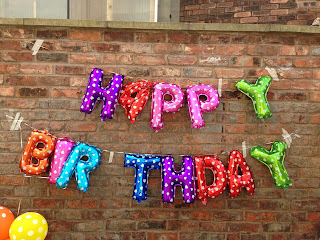Tony shares his birthdaywith an illustrious populace, including Joseph Pulitzer, Omar Sharif, Vincent Kompany (of whom he definitely will not have heard), William Booth, Charles Hallé, Mandy Moore and heavy metal guitarist Mike Mushok. The only people actually born on the same day as Tony that I could discover were René Follet, William Wingfield, Gérald Forton. I have no idea who they are - do you expect me to do all the work for you?
Saturday, 10 April 2021
Ninety
Tony shares his birthdaywith an illustrious populace, including Joseph Pulitzer, Omar Sharif, Vincent Kompany (of whom he definitely will not have heard), William Booth, Charles Hallé, Mandy Moore and heavy metal guitarist Mike Mushok. The only people actually born on the same day as Tony that I could discover were René Follet, William Wingfield, Gérald Forton. I have no idea who they are - do you expect me to do all the work for you?
Friday, 9 April 2021
Three Sisters Playing Chess
Thursday, 8 April 2021
Mother Carey's Chickens
- Building Resilient Communities: The Challenges of Organising Locally
- Community Activism in South Essex
- Mutual Aid during the Pandemic
- Charity or Solidarity?
- Covid Mutual Aid: A Revolutionary Critique
- ACORN – no mighty oak!
- Anarchist Communists, anti-fascism and Anti-Fascism
- Women: Working and Organising
- What is Anarchist Communism? (excerpt from Brian Morris’s forthcoming book)
- Poll Tax Rebellion – Danny Burns
- Book Reviews – Putting the poll tax rebellion in perspective
- We Fight Fascists: The 43 Group and Their Forgotten Battle for Post-War Britain
- Class Power on Zero Hours
- McMindfulness: How Mindfulness Became the New Capitalist Spirituality
Wednesday, 7 April 2021
Never Let Me Go
Sunday, 4 April 2021
Give us an 'N'
That's what you'd be shouting if I was playing football and you and the other fans were encouraging me with chants:
Give us an 'N'
Give us an 'I'
Give us a 'G'
Give us an 'E'
Give us an 'L'
And so on until you had spelt out my surname too.
Imagine yourself a fan of Sutton United, whose striker is...
Isaac Tanitoluwaloba Aduraoluwatimileyin Olaofe. Don't worry, there are 90 minutes in a football match so you've got time.
Isaac is actually a Millwall player, on loan at suburban Sutton. He scored a hat trick in November.
Sutton are currently top of the National League, with a decent chance of getting promoted to the Football League come the end of the season. At the other end of the National League table there is...
Dover Athletic - played 0, won 0, drawn 0, lost 0; goals for 0, goals against 0. How come?
Sadly, the lockdown measures - no fans in stadiums - have ruined the finances of many small clubs and Dover decided that the cost of playing home matches, set against the total lack of match day income, was simply not sustainable. So they decided to not play any matches, effectively defaulting.
It's very sad so...
Give us a 'D'
Give us an 'O'
Give us a 'V'
Give us an 'E'
Give us an 'R'
Let's hear it!
Thursday, 1 April 2021
Puzzle Palace
More clunky video. I hope you can enjoy the content despite my obvious lack of movie making skills!



